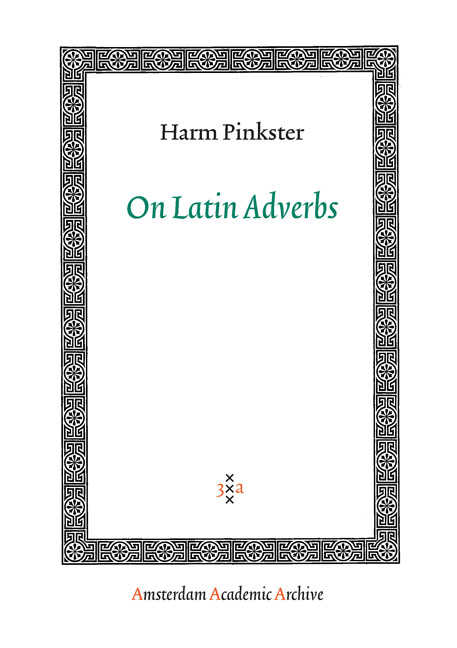Book contents
- Frontmatter
- Preface to this Edition
- Preface
- Contents
- Introduction
- 1 General Problems of Studying a Dead Language
- 2 Problems of Classification
- 3 Adverbs in Roman Grammatical Theory
- 4 The Adverb in Latin Linguistics
- 5 Adverbs as Derived Forms
- 6 Syntactic Problems
- 7 Subclassification of Adverbs
- 8 Adverbs and other Invariables
- 9 The Relationship Between Adverbs and Prepositions
- 10 Adverbs and Connectors
- 11 Adverbs and Subordinators
- Bibliography
- Indices
- Index Auctorum
- Titles Published in the Aaa Series
6 - Syntactic Problems
Published online by Cambridge University Press: 24 January 2021
- Frontmatter
- Preface to this Edition
- Preface
- Contents
- Introduction
- 1 General Problems of Studying a Dead Language
- 2 Problems of Classification
- 3 Adverbs in Roman Grammatical Theory
- 4 The Adverb in Latin Linguistics
- 5 Adverbs as Derived Forms
- 6 Syntactic Problems
- 7 Subclassification of Adverbs
- 8 Adverbs and other Invariables
- 9 The Relationship Between Adverbs and Prepositions
- 10 Adverbs and Connectors
- 11 Adverbs and Subordinators
- Bibliography
- Indices
- Index Auctorum
- Titles Published in the Aaa Series
Summary
In this chapter I will deal with the closeness of relationship ('affinity’) between constituents. One aspect of this concept is the optionality of some constituents with respect to others. Optionality vs. obligatoriness of constituents bears on the concept of modification. Since the definition of adverbs is formulated in terms of modification, clarification of this notion is required. It will appear that ‘modification’ is not clearly defined. In this chapter I will suggest that adverbs occur with at least three different degrees of affinity towards the verb, in other words that adverbs occur at three different levels in the structure of sentences.
Modification
In the section on syntax of the fourth chapter (4.3.) it was shown, that given the definition of adverbs and given the words that are generally assigned to the category of adverbs, the definition - if conceived of in a generative way - on the one hand allows for constructions which are in fact ungrammatical, on the other hand excludes constructions which are grammatical. The notion ‘modification’ was accepted without a discussion. However, this notion is not at all as clear as its frequency of use might suggest. Therefore, I will now examine it in detail.
Modification is considered to be related to the notion of optionality of a constituent with respect to another constituent, especially the verb. This notion ‘optionality’ is problematic as well. It will appear that the notion of modification is closely connected with the sentence model that is tacitly or not assumed in traditional and modern grammar. I will try to reconstruct the model within the framework of which Kuhner-Stegmann describe ADJUNCTS and compare it with other models
Modification interpreted as optionality with respect to the verb
The notion ‘modify’ (German ‘bestimmen'; French ‘determiner’) plays an important role in Latin and other studies, but is seldom defined (Swiiste 1963: passim;.Crystal 1967: 48). Kiihner-Stegmann are a notable exception. These authors recognize two main types of modification ('Bestimmung’): (a) modification of the subject, (b) modification of the predicate. By the side of modification of the predicate they recognize ‘addition’ ('Erganzung’) to the predicate (see below). The subject modifiers are called attributive.
- Type
- Chapter
- Information
- On Latin Adverbs , pp. 71 - 102Publisher: Amsterdam University PressPrint publication year: 2005



